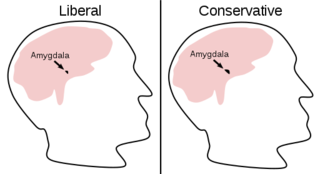Media
How We Become Liberal or Conservative
Knowing the forces that act on us can free us to choose.
Posted September 6, 2021 Reviewed by Devon Frye
Key points
- Genes, peers, parents, teachers, professors, media, and spiritual institutions all affect our political leanings.
- More than half of our political leanings are affected by our environment, which allows us to alter our views.
- Making even incremental changes can enable us to fairly consider new political viewpoints.

A number of forces likely lead us to become liberal or conservative. Being aware of them can help us decide which to welcome and which to devalue.
Genetics. Genes matter. A 2020 review of the literature by NYU and University of Wisconsin researchers found that “Twin studies and more sophisticated approaches that have now emerged, consistently show that ideology is about 40 percent heritable.”
Peers. Of course, peers affect our views. For example, a study by University of Calgary researchers found that "Discoveries of political group membership may influence the development or maintenance of friendships." In other words, we tend to make and develop friends with people like us, thereby creating an ideological bubble, whether liberal or conservative.
Parents. Your parents, without proselytizing or even mentioning politics, can influence our political views. A 2020 Scientific American review of the literature concluded, “The research shows that conservatives desire security, predictability, and authority more than liberals do.” So, parents who are laissez-faire may lead their child to be a bigger risk-taker and hence be more likely to become liberal. Conversely, a cautious parent may be more likely to convey to a child that change, on average, is unwise and thus, the child is more likely to become conservative.
Teachers and professors. Even in elementary school but especially in high school and college, many teachers and professors, consciously or not, inculcate conservative and, more often, liberal values. For example, a review of the literature by a self-described right-of-center professor at Sarah Lawrence College and a left-of-center one at Carleton College, "unequivocally show that liberals are considerably overrepresented on university and college campuses. And the research on campus climate reveals a decrease in openness to non-liberal viewpoints."
But does that actually affect students' political views? To address that question, a survey of 3,486 students by Ohio State University and North Carolina State University researchers found, "Over four years of college, students develop positive attitudes for political liberals but not conservatives.:" And it doesn't always start in college—some evidence suggests that this shift can, in some cases, start in high school or earlier.
Media. Whether the media was ever unbiased is unclear, but most of today's media certainly has a perspective, whether toward the left or right. If you consume mainly conservative media, it likely will make you more conservative and vice versa.
Spiritual influences. Religious institutions range from fundamentalist right-wing to radical leftist, as reported by a Pew Research Center's survey.
The Takeaway
While 40 percent of our political leanings may have genetic roots, that leaves more than half to the environment. As you consider the factors above, are you satisfied with your influencers? Or would you like to change them, if only modestly, so you can more easily consider multiple perspectives?
I read this aloud on YouTube.


